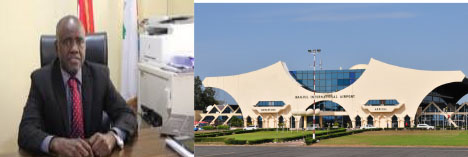
He emphasised the importance of enhanced collaboration and coordination among security agencies at the airport to accomplish this critical goal.
Speaking at the opening of a five-day training for law-enforcement officers at the airport, DG Ceesay stated: “We must dedicate ourselves to actively safeguarding the airport and the nation from drug trafficking and other illicit activities. Again, training without ethics is meaningless. Our unity at the leadership level must reflect the teamwork on the ground to transform this airport into a stronghold against crime.”
On Monday 24 March 2025, the United Nations Office on Drugs and Crime (UNODC), in partnership with the European Union (EU), launched a comprehensive five-day training programme for members of the Joint Airport Interdiction Task Force (JAITF) at Banjul International Airport.
The training, scheduled from March 24th to 28th, 2025, is designed to empower personnel with cutting-edge techniques for identifying high-risk air passengers. This initiative seeks to effectively disrupt the illegal flow, trafficking, and trade of illicit drugs orchestrated by organised transnational drug syndicates.
The training session, attended by high-ranking officials from the Gambia Police Force, Immigration Department, Customs, and intelligence agencies, is centred on intelligence-led profiling, behavioural analysis, and fostering inter-agency collaboration.
Esteemed experts from Nigeria and the United Nations Office on Drugs and Crime (UNODC) facilitated the sessions, sharing invaluable insights from their extensive experience in airports such as Lagos to showcase best practices in curbing illicit activities.
During the forum, UNODC Representative Fabienne stated: “Criminals evolve, and we must evolve alongside them. This training presents a unique opportunity to learn, unlearn, and relearn strategies that will keep us one step ahead.”
She emphasised Nigeria's success story, noting how persistent efforts at Lagos Airport have successfully dismantled trafficking rings.
Raphael Brigandi, deputy Head of Delegation of the EU, commended Gambia’s Joint Airport Interdiction Task Force (JAITF) for its impressive achievement of seizing 200 kg of drugs since 2020, including a recent MDMA confiscation. Drawing from a case at Brussels Airport, he highlighted how the strategic targeting of passengers resulted in the dismantling of a multi-country drug trafficking operation: “It’s not just about the seizures—it’s about breaking down the networks that enable them.”
Since 2014, the EU has backed JAITF through its Global Illicit Flows Program, which operates at 41 airports across the globe. As west Africa becomes a growing focus for traffickers, the training is designed to bolster Gambia's position as a key regional security ally. Officers were encouraged to apply their newly acquired skills to safeguard the nation's reputation and play a vital role in wider anti-crime initiatives.
The program wraps up today, with hopes that participants will share their newfound knowledge with their peers, creating a powerful "train-the-trainer" ripple effect. As transnational crimes become increasingly sophisticated, these initiatives underscore the essential role that international partnerships play in protecting state borders and communities.





